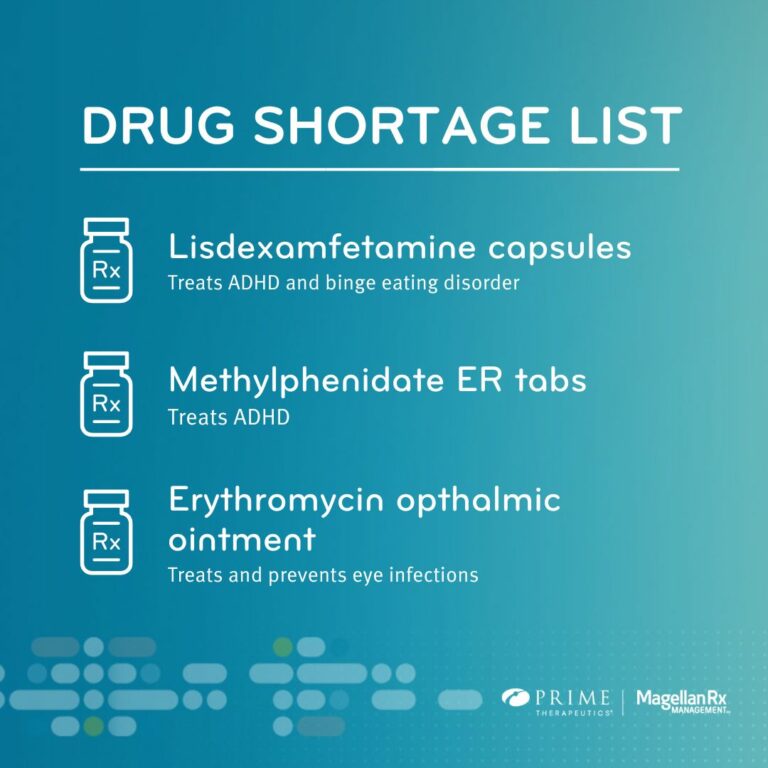Perspectives
Prime/MRx helps clients and members navigate drug shortages
Constant communication across the supply chain limits disruption when a drug is unavailable
May 7, 2024 Currently, there are more than 300 ongoing drug shortages in the United States, which is at an all-time high, according to the American Society of Health-System Pharmacists (ASHP). For Prime Therapeutics/Magellan Rx Management (Prime/MRx)’s commercial clients, the most heavily impacted drug classes include glucagon-like peptide 1 (GLP-1) agonist weight loss medications, attention-deficit/hyperactivity disorder (ADHD) stimulants and growth hormones. While shortages can cause lapses in therapy and negative impacts on health, our member-centric philosophy strives to limit disruptions.
Currently, there are more than 300 ongoing drug shortages in the United States, which is at an all-time high, according to the American Society of Health-System Pharmacists (ASHP). For Prime Therapeutics/Magellan Rx Management (Prime/MRx)’s commercial clients, the most heavily impacted drug classes include glucagon-like peptide 1 (GLP-1) agonist weight loss medications, attention-deficit/hyperactivity disorder (ADHD) stimulants and growth hormones. While shortages can cause lapses in therapy and negative impacts on health, our member-centric philosophy strives to limit disruptions.
When a covered drug is unavailable due to a shortage, Prime/MRx has a process in place to enable pharmacists to verify the noted shortage via resources such as the Food and Drug Administration (FDA) Drug Shortage List and ASHP and empower pharmacists to approve a coverage exception to avoid any lapse in therapy when there are no other appropriate covered agents. It’s common, for example, to see shortages of generic drugs, and in those cases, the recommendation is to waive the generic-first requirement.
Prime/MRx monitors for drug shortages from the ASHP and FDA websites. We also leverage manufacturer and distributor relationships to make proper adjustments to pharmacy reimbursements if needed.
If most manufacturers are reporting a shortage of a product, Prime/MRx can adjust its pricing and coverage to account for these shortages. If many of the generic products are on shortage, we can remove generic-first requirements and allow the branded product to be reimbursed. These adjustments incentivize pharmacies to dispense the brand drug over the generic drug and help replenish supplies.
 Through constant communication with clients, manufacturers, wholesalers and regulators, we are often aware of an emerging shortage before it impacts the public. Coverage decisions begin with NetResultsTM, our standard national formulary, which includes a balanced mix of drugs that enable clients to make choices that best meet their needs.
Through constant communication with clients, manufacturers, wholesalers and regulators, we are often aware of an emerging shortage before it impacts the public. Coverage decisions begin with NetResultsTM, our standard national formulary, which includes a balanced mix of drugs that enable clients to make choices that best meet their needs.
When Prime/MRx learns of a shortage that affects a NetResults-covered drug, we consider multiple factors, including the scope and expected duration of the shortage, available alternatives and their position on the formulary, utilization management requirements and the potential financial impact on members and clients.
We apply the same evaluation process evenly to all drugs and diagnoses because the impact may vary. If an alternative medication is needed, the Prime/MRx team initiates our process to add such medication to our Drug Shortage List and clients are notified through Trade and Clinical client teams. As of May 1, that list includes three drugs:
- Lisdexamfetamine capsules. Treats ADHD and binge eating disorder.
- Methylphenidate extended-release (ER) tabs. Treats ADHD.
- Erythromycin opthalmic ointment. Treats and prevents eye infections.
The duration and impact of a drug shortage is extremely difficult to predict. And temporary formulary additions can take six months to remove; impacting clients, plan sponsors, prescribers and pharmacies.
Our top priority is providing members with coverage options while maintaining the clinical integrity of the formulary through a thoughtful, measured process.
Related news
Perspectives
July 25, 2024
Quarterly Drug Pipeline: July 2024
Clinical insights and competitive intelligence on anticipated drugs in development
Perspectives
July 22, 2024
Oncology Insights: 2024 ASCO Annual Meeting key findings
Findings from this year’s American Society of Clinical Oncology (ASCO) Annual Meeting will likely lead to clinical practice changes and U.S. Food and Drug Administration (FDA) drug approvals or expansions
Perspectives
July 16, 2024
LISTEN NOW: Beyond the business – Stories of corporate kindness | Pharmacy Friends Podcast
In this episode, we talk about how our employees' help goes beyond our work in health care, aiding in philanthropic efforts